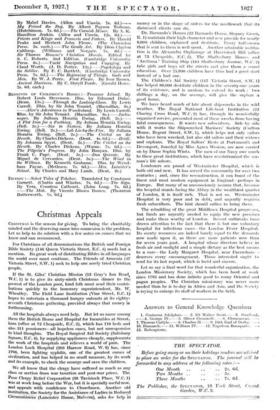Christmas Appeals
CHRISTMAS is the season for giving. To bring the charitably_ minded and the deserving cause into connexion is the problem. Let us help to its solution with a few notes on causes that we know and can recommend.
For Christians of all denominations the British and Foreign Bible Society (146 Queen Victoria Street, E.C. 4) needs but a. mention. Its great work of distributing Bibles in all languages the world over must continue. The Friends of Armenia (47 Victoria Street, S.W. 1) seek to help one sorely tried Christian, people.
If the St. Giles' Christian Mission (13 Gray's Inn Road, W.C. 1) is to give its sixty-ninth Christmas dinner to the poorest of the London poor, kind folk must send their contri- butions quickly to the honorary superintendent, Mr. W, Wheatley. The Field Lane Institution (Vine Street, E.C. 1) hopes to entertain a thousand hungry outcasts at its eighty- seventh Christmas gathering, provided always that money is forthcoming.
All the hospitals always need help. But let us name among them the British Home and Hospital for Incurables at Street. ham (office at 72 Cheapside, E.C. 2), which has 110 beds and also 311 pensioners-all hopeless cases, but not unresponsive_ to kind thoughts. The Royal Surgical Aid Society (Salisbury Square, E.C. 4), by supplying appliances cheaply, supplements- the work of the hospitals and relieves a world of pain. The London Lock Hospital (283 Harrow Road, W. 9) has, since Me, been fighting syphilis, one of the greatest curses of civilization, and has helped in no small measure, by its. work- and its example, to check the scourge and save the children.
We all know that the clergy have suffered as much as any class or section from war taxation and post-war prices. The Poor Clergy Relief Corporation (38 Tavistock Place, W.C. 1) Was at work long before the War, but it is specially useful now, and appeals with confidence to Churchmen. Another old- institution, the Society for the Asiisfance of Ladies in Reduced Circurnitiriees (Lancaster Houser lilalVern), asks for help in money or in the shape of orders for the needlework that it distressed clients can do.
Dr. Barnardo's Homes (22 Bernardo House, Stepney Creen, E. 1) maintain their high character and now provide for nearly 8,000 children, orphaned and destitute. Every half-crown that is sent to them is well spent. Another admirable institu- tion is the Alexandra Orphanage at Ilaverstock hill (office • at 73 Cheapside, E.C. 2). The Shaftesbury Homes and Arethusa "fraining Ship (184 Shaftesbury Avenue, W.C. 2) take girls and boys oil' the streets and give them a sound education. Over 25,000 children have thus had a good start instead of a bad one.
The Children's Aid Society (117 Victoria Street, S.W. 1) has helped 80,000 destitute children in the seventy-one years of its existence, and is anxious to extend its work ; two shillings a day, on the average, will give the orphan a good home.
We have heard much of late about shipwrecks in the wild weather. The Royal National Life-boat Institution (22 Charing Cross Road, W.C. 2) has, through its wonderfully organized service, prevented most of these wrecks from having fatal consequences. It wants new subscribers. Side by side with it works the Shipwrecked Mariners' Society (Carlton • House, Regent Street, S.W. 1), which helps not only sailors who have been wrecked, but also old sailors and their widows and orphans. The Royal Sailors' Rests at Portsmouth and Devonport, founded by Miss Agnes Weston, are now carried on by Dame Sophia Wintz. The men of our Navy owe much to these great institutions, which have revolutionized the sea- man's life ashore.
Londoners are proud of Westminster Hospital, which is both old and new. It has served the community for over two centuries ; and, since the reconstruction, it can boast of the finest and most modern equipment in England-perhaps in . Europe. But many of us unconsciously assume that, because the hospital stands facing the Abbey in the wealthiest quarter of London, it is itself rich. That is not so. Westminster Hospital is very poor and in debt, and urgently requires fresh subscribers. The hint should suffice to bring them.
The rebuilding of the great Middlesex Hospital progresses, but funds arc urgently needed to equip the new premises and make them worthy of London. Recent outbreaks have drawn attention to the fact that there is but one voluntary hospital for infectious cases-the London Fever Hospital. Its scanty resources are indeed barely equal to the demands now made upon it, as there arc more patients now than for seven years past. A hospital whose directors believe in fresh air and sunlight and a simple dietary as the best means to a cure-the Lady Margaret Hospital, near Faversham- - deserves every encouragement. Those interested ought to send for its last report, which is lucid and sincere.
Let us say a final word for that wonderful organization, the London Missionary Society, which has been hard at work since 1795 and has done infinite good to many Oriental and pagan peoples. The Christian missionary was never more needed than he is to-day in Africa and Asia, and the Satiety is trying to enlarge its staff of workers in the field.










































































 Previous page
Previous page